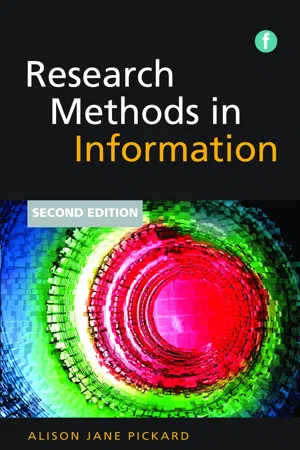
- 384 pages
- English
- PDF
- Available on iOS & Android
Research Methods in Information
About this book
The long-awaited 2nd edition of this best-selling research methods handbook is fully updated and includes brand new coverage of online research methods and techniques, mixed methodology and qualitative analysis.
This edition includes two new contributed chapters: Professor Julie McLeod, Sue Childs and Elizabeth Lomas focus on research data management, applying evidence from the recent JISC funded 'DATUM' project; Dr Andrew Shenton examines strategies for analysing existing documents.
The first to focus entirely on the needs of the information and communications community, this handbook guides the would-be researcher through the variety of possibilities open to them under the heading 'research' and provides students with the confidence to embark on their dissertations. The focus here is on the 'doing' and although the philosophy and theory of research is explored to provide context, this is essentially a practical exploration of the whole research process with each chapter fully supported by examples and exercises tried and tested over a whole teaching career.
Readership: Students of information and communications studies and archives and records management, and practitioners beginning a piece of research.
Tools to learn more effectively

Saving Books

Keyword Search

Annotating Text

Listen to it instead
Information
Table of contents
- Title page
- Contents
- Part 1 Starting the research process
- Chapter 1 Major research paradigms
- Chapter 2 Reviewing literature
- Chapter 3 Defining the research
- Chapter 4 The research proposal
- Chapter 5 Sampling
- Chapter 6 Research data management
- Chapter 7 Ethics in research
- Part 2 Research methods
- Chapter 8 Case studies
- Chapter 9 Surveys
- Chapter 10 Experimental research
- Chapter 11 Usability testing
- Chapter 12 Ethnography
- Chapter 13 Delphi study
- Chapter 14 Action research
- Chapter 15 Historical research
- Chapter 16 Grounded theory: method or analysis?
- Part 3 Data collection techniques
- Chapter 17 Interviews
- Chapter 18 Questionnaires
- Chapter 19 Observation
- Chapter 20 Diaries
- Chapter 21 Focus groups
- Chapter 22 Analysis of existing, externally created material
- Part 4 Data analysis and research presentation
- Chapter 23 Qualitative analysis
- Chapter 24 Quantitative analysis
- Chapter 25 Presenting the research
- Part 5 Glossary and references
- Index
Frequently asked questions
- Essential is ideal for learners and professionals who enjoy exploring a wide range of subjects. Access the Essential Library with 800,000+ trusted titles and best-sellers across business, personal growth, and the humanities. Includes unlimited reading time and Standard Read Aloud voice.
- Complete: Perfect for advanced learners and researchers needing full, unrestricted access. Unlock 1.4M+ books across hundreds of subjects, including academic and specialized titles. The Complete Plan also includes advanced features like Premium Read Aloud and Research Assistant.
Please note we cannot support devices running on iOS 13 and Android 7 or earlier. Learn more about using the app